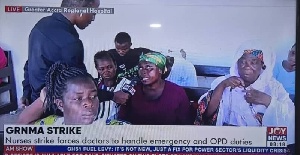- Home - News
- Elections 2024
- News Archive
- Crime & Punishment
- Politics
- Regional
- Editorial
- Health
- Ghanaians Abroad
- Tabloid
- Africa
- Religion
- Photo Archives
- Press Release
General News of Thursday, 5 June 2025
Source: www.ghanawebbers.com
Emergency services paralyzed as nurses’ strike grips Ghana’s public hospitals
The nationwide strike by the Ghana Registered Nurses and Midwives Association (GRNMA) has disrupted emergency services at major government hospitals. Patients are stranded, and healthcare delivery is severely affected.
On the second day of the strike, facilities like Greater Accra Regional Hospital saw empty outpatient departments and emergency wards. Patients seeking urgent care found no assistance. The absence of nurses halted routine operations.
Medical doctors reported a sharp drop in patient numbers. Daily visits fell from 600 to just 100 due to lack of nursing support. Even rotation nurses did not show up for work.
JOYNEWS correspondent Collins Frimpong observed chaos at the ambulance unit. No staff were available to assist patients. One patient traveled from Takoradi for treatment but was unsure when she would see a doctor. Two frustrated patients expressed concern about their health due to the strike.
One woman returned for an eye review but could not get help: “I can’t even see a doctor.” Another distressed patient urged the government to act quickly: “We need intervention now or this could become a national catastrophe.”
The strike began on June 4 after the government failed to implement improved conditions of service from the 2024 Collective Agreement. Despite emergency directives from the Ministry of Health, GRNMA insists that the strike is necessary due to ongoing neglect of nurses' welfare.
In Kumasi, pregnant women are struggling as hospitals face similar disruptions. One patient told JOYNEWS' Clinton Yeboah that she was turned away when seeking care.
The National Labour Commission (NLC) has declared the strike illegal. They ordered GRNMA to return to work and resume negotiations with the Fair Wages and Salaries Commission.
As this standoff continues, patients across Ghana's public hospitals are suffering. Many fear that delays in care could be fatal. There are increasing calls for the government to resolve this issue urgently and restore essential healthcare services.











